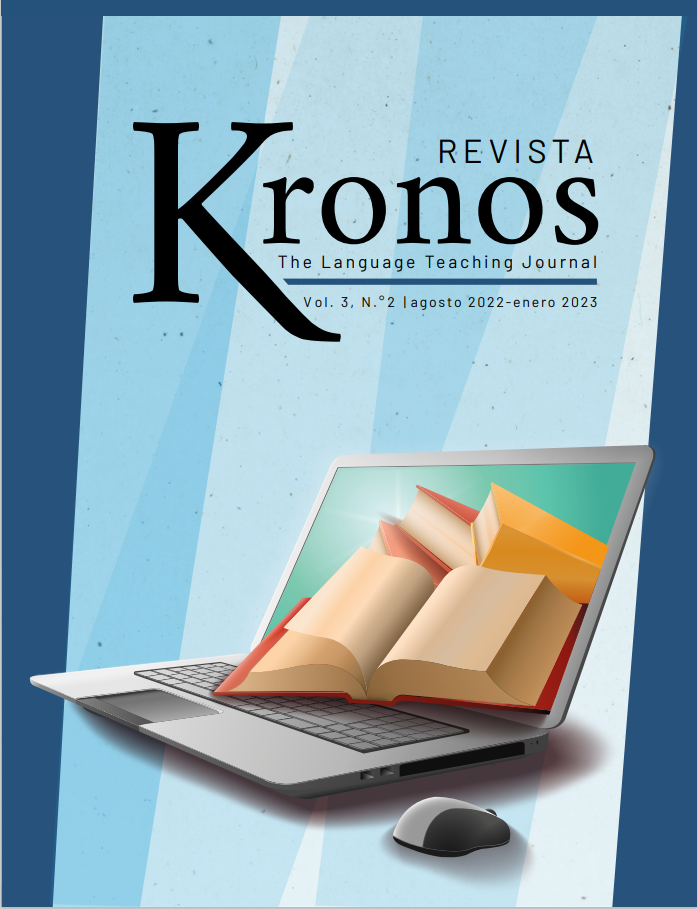Factores que impiden la producción oral en inglés de los estudiantes de primer y segundo año de bachillerato
DOI:
https://doi.org/10.29166/kronos.v3i2.3829Palabras clave:
Lengua inglesa, producción oral, limitaciones, factores, motivaciónResumen
El inglés se ha convertido en el idioma de comunicación universal de los negocios, el turismo, la educación, la tecnología y la ciencia. Desarrollar las habilidades orales de los estudiantes en el aula se ha convertido en un gran desafío para los profesores de inglés, ya que existen limitaciones para producir el idioma de destino. Por lo tanto, el propósito principal de este estudio fue identificar los factores que impiden la producción oral en inglés de los estudiantes de primero y segundo año de bachillerato. Esta investigación utilizó un enfoque cuantitativo, donde se aplicó una encuesta
y una guía de observación para estudiantes y docentes, con el fin de recolectar la información de los datos. La población de este estudio fue de 34 estudiantes y un docente. Los principales resultados mostraron que los estudiantes no desarrollan habilidades para hablar porque tienen miedo de cometer errores en sus presentaciones orales y consideran que el inglés es difícil de pronunciar. Además, los factores afectivos negativos como la ansiedad, la presión, el nerviosismo y
la aprensión influyeron directamente en su desempeño oral. Estos obstáculos a los que se enfrentan los alumnos a diario en el aula pueden reducirse mediante la motivación y la confianza constantes. Por lo tanto, es recomendable el uso frecuente de actividades interesantes y dinámicas que promuevan la comunicación en situaciones reales a fin de lograr el objetivo académico que es mejorar la competencia oral de los estudiantes.
Descargas
Citas
Adwani, P., & Shrivastava, S. (2017). Analysis of factors affecting second language acquisition. International Journal of Social Sciences and Management, 4(3), 158-164.
Ahmad, S. R. (2016). Importance of English communication skills. International Journal of Applied Research, 2(3), 478-480.
Akhter, S., Haidov, R., Rana, A. M., & Qureshi, A. H. (2020). Exploring the significance of speaking skill for EFL learners. PalArch's Journal of Archaeology of Egypt/Egyptology, 17(9), 6019-6030.
Ansari, M. S. (2015). Speaking anxiety in ESL/EFL classrooms: A holistic approach and practical study. International Journal of Education Investigation, 2(4), 38-46.
Arnold, J. (2003). Speak easy: How to ease students into oral production. Humanising Language Teaching, 5(2), 1-13.
Benalcázar-Bermeo, J., & Ortega-Auquilla, D. (2019). Effects of the CLIL approach in oral production of english students in the second year of the united general baccalaureate at a high school in Cuenca, Ecuador. Revista Boletín Redipe, 8(12), 117-128.
Bhattacharjee, N. (2008). Developing speaking skill at secondary and higher secondary levels: problems and few recommendations. Stamford Journal of English, 4, 15-29.
Clement, A., & Murugavel, T. (2018). English for the workplace: The importance of English language skills for effective performance. The English Classroom, 20(1), 1-15.
Dilnoza, K. (2021). DEVELOPING SPEAKING SKILLS OF ESL AND EFL STUDENTS. Web of Scientist: International Scientific Research Journal, 2(09), 116-119.
Dincer, A., & Dariyemez, T. (2020). Proficient Speakers of English as a Foreign Language: A Focus-Group Study. IAFOR Journal of Education, 8(1), 83-99.
Elahifar, M. (2022). Effect of hot Seat technique on pre-intermediate learners' oral production. Journal of new advances in English Language Teaching and Applied Linguistics, 4(1), 739-752.
ESCUDERO, G. I., CUTIOPALA, D. J., & CAISAGUANO, J. A. (2020). A comprehensible overview of EFL students’ drawbacks to produce oral communication. Revista Espacios, 41(18).
Han, L., & Yusof, M. A. M. (2019). Students’ self-reflections of own participation in English language oral class. LSP International Journal, 6(2).
Jiménez, G. V. (2015). Three communication difficulties of EFL students. Revista de Lenguas Modernas, (23).
Khoirunisya’Masyhudianti, U., & Masithoh, H. (2018). A Teacher’s Beliefs and Practices of Using Video to Teach Speaking: A Case Study At SMA As-Salam Surakarta. Vision: Journal for Language and Foreign Language Learning, 7(1), 11-22.
Leong, L. M., & Ahmadi, S. M. (2017). AN ANALYSIS OF FACTORS INFLUENCING LEARNERS’ENGLISH SPEAKING SKILL.
Manrique, C. M. R. (2013). Mother Tongue Interference over Foreign Language: A Case Study about A2 Oral Production in a Colombian Public University. Opening Writing Doors Journal, 9(1), 91-119.
Publicado
Cómo citar
Número
Sección
Licencia
Derechos de autor 2022 Vinicio Bermello García, Mónica Vaca-Cárdenas

Esta obra está bajo una licencia internacional Creative Commons Atribución-NoComercial-CompartirIgual 4.0.












